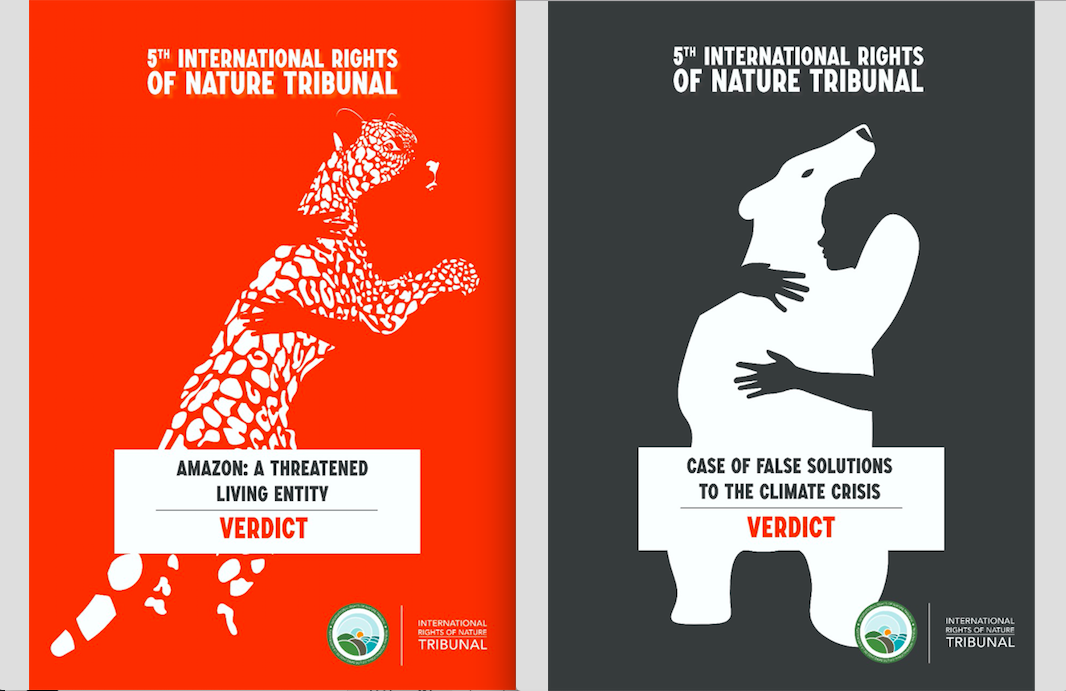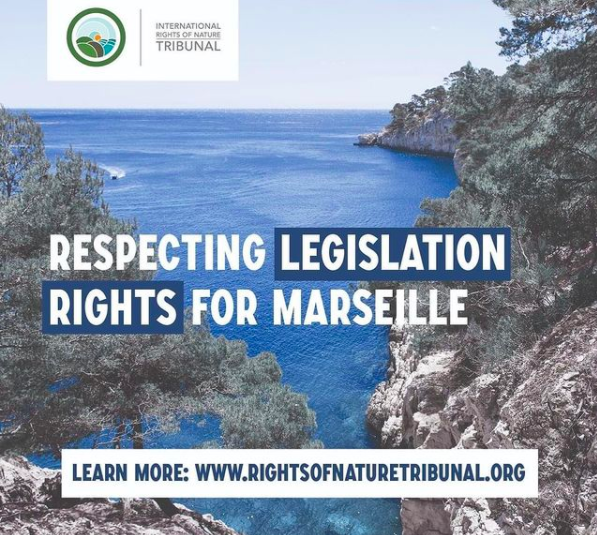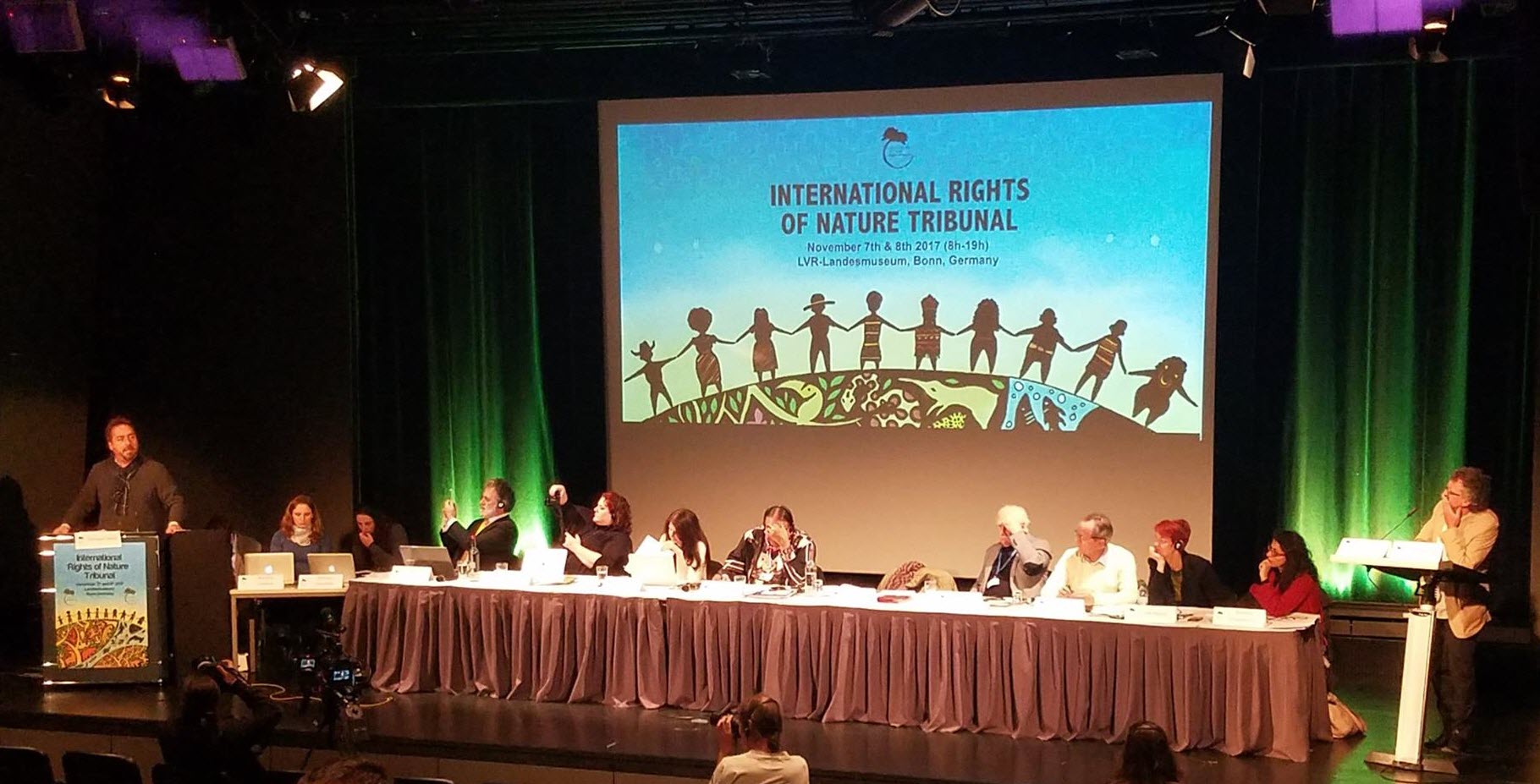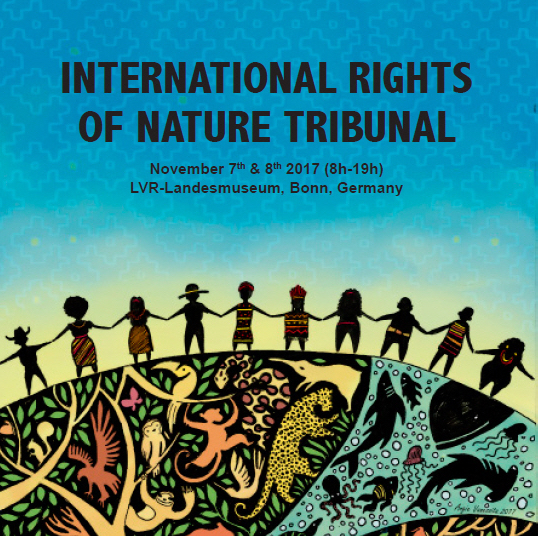(4 December 2015) Download a printable Tribunal Statute PDF
Contents
Article 1. Nature and Legal Organization. 1
Article 2. Powers and duties of Tribunal 1
Article 3. Jurisdiction and applicable law.. 2
Article 4. Seat. 2
Article 5. Composition. 3
Article 6. Term of Office. 3
Article 7. Election of Tribunal members. 4
Article 8. Voting by Electoral College. 4
Article 9. Presidency. 4
Article 10. Mother Earth Defender’s Office. 4
Article 11. Secretariat. 5
Article 12. Chambers of the Tribunal 5
Article 13. Regional Chambers. 6
Article 14. Incompatible positions and activities. 7
Article 15. Disqualification. 7
Article 16. Standard of conduct and disciplinary authority. 7
Article 17. Resignation and incapacity. 8
Article 18. Official and working languages. 8
Article 19. Sessions. 8
Article 20. Quorum.. 8
Article 21. Hearings, Deliberations, Decisions. 8
Article 22. Rules and Regulations. 9
Article 23. Budget, Financial System.. 9
Article 24. Cooperation Agreements. 9
Article 25. Transitional Arrangements. 9
Article 26. Translations and Amendments to the Statute. 10
Article 27. Interpretation. 10
Article 28. Entry into Force. 10
CHAPTER I
GENERAL PROVISIONS
Article 1. Nature and Legal Organization
(1) The International Tribunal of Mother Earth Rights is an autonomous judicial institution constituted by these Statutes pursuant to the entry into force of the People’s Convention for the Establishment of the International Tribunal of Mother Earth Rights.
(2) The Tribunal is established to promote universal respect for and observance of the rights and duties established by the Universal Declaration of the Rights of Mother Earth, and thereby promote the harmonious co-existence of humans and other beings.
(3) The Tribunal exercises its functions in accordance with the provisions of the People’s Convention, the present Statute and any rules adopted by the Tribunal under Article 22.
(4) Regional Chambers of the Tribunal may be established in accordance with Article 13.
Article 2. Powers and duties of Tribunal
(1) The Tribunal:
(a) may conducting investigations into alleged violations of the Declaration;
(b) may conduct preliminary hearings to determine whether or not a case submitted to the Tribunal for consideration should be heard;
(c) must hear cases involving alleged violations of the Declaration in order to determine whether or not a violation has occurred, the causes of any violation; and the measures that should be taken to prevent such violations recurring and to restore any harm to the beings and communities that constitute Mother Earth that have occurred, or may occur, as a consequence of any violation;
(d) may recommend that parties involved in a case before it participate in mediation, restorative justice proceedings or other means of reaching agreement on and implementing measures to prevent violations of the Declaration recurring and to restore any harm to the beings and communities that constitute Mother Earth that have occurred, or may occur;
(e) must giving judgements and advisory opinions that interpret the Declaration and apply it to particular circumstances, and promote the harmonious co-existence of humans and other beings;
(f) may indicate any provisional measures which ought to be taken to preserve the respective rights of a party (including Mother Earth);
(g) must publicising its work, judgements and advisory opinions;
(h) may propose amendments to the present Statute to the Conference of the Parties;
(i) may enter into co-operation agreements in accordance with Article 24;
(j) may participate in research, education and training initiatives; and
(k) must publish an annual report on its work of the previous year which must include a report on any cooperation agreements and their results.
(2) The failure or a party to participate in proceedings in which that party has been cited as an applicant or defendant does not invalid the proceedings or affect the exercise by the Tribunal of its powers, and the Tribunal may make orders, findings and judgments in spite of the absence of any affected party.
Article 3. Jurisdiction and applicable law
(1) The Tribunal has jurisdiction to investigate and rule on any serious violation of the rights, or breach of the duties, established by the Universal Declaration of the Rights of Mother Earth, whether committed by international organisations, states, public or private juristic persons, or individuals.
(2) The geographical jurisdiction of the Tribunal is global and is not limited by any political, legal or physical boundaries.
(3) In interpreting and applying the Universal Declaration of the Rights of Mother Earth the Tribunal:
(a) must have regard to the laws of Nature (as defined in article Article 27(1)(c));
(b) must have regard to, but is not bound by, previous decisions of the Tribunal that are relevant to the matter before the Tribunal;
(c) may have regard to:
(i) international human rights law (including the Universal Declaration of Human Rights and the United Nations Declaration on the Rights of Indigenous Peoples);
(ii) generally accepted principles of law reflected in judicial decisions or the teachings of respected jurists;
(iii) international law including treaties and customary international law;
(iv) traditional knowledge and customary relevant to the place or places in question.
(4) In determining the content and likely implications of natural laws the Tribunal may have regard to the opinion of scientists, persons with long standing experience of, or traditional wisdom in relation to, a particular ecological community or other experts.
Article 4. Seat
(1) The seat of the Tribunal shall be in Quito, Ecuador.
(2) The seat of the Tribunal may be changed by a vote of two-thirds of the members of the Conference of the Parties to the Convention voting in person or by proxy at a duly convened meeting.
(3) Each regional structure of the Tribunal must determine its own seat.
(4) The Tribunal may convene hearings at any place or time that the Tribunal considers desirable.
CHAPTER II
COMPOSITION OF THE TRIBUNAL
Article 5. Composition
(1) The Tribunal is composed of at least three and not more than twenty members, who must be of the highest integrity, recognised for both their commitment to the protection of the Earth community and their competence in a field relevant to the work of the Tribunal.
(2) The Tribunal must include members appointed on the basis of their expertise in:
(a) the law applied by the Tribunal;
(b) the culture and law of indigenous peoples; and
(c) the ecology of biomes or ecosystems that are at risk of being harmed by alleged violations of the Universal Declaration of the Rights of Mother Earth that are under consideration by the Tribunal.
(3) A member of the Tribunal may also be a member of one or more regional chamber of the Tribunal.
(4) Members of the Tribunal are elected by an Electoral College established by the Conference of the Parties to the People’s Convention.
(5) Tribunal members, may within the limits of the Tribunal’s budget, be remunerated and when appropriate, be paid per diem and travel allowances.
Article 6. Term of Office
(1) Tribunal members are elected for a term of three years and may be re-elected. A judge elected to replace a Tribunal member whose term has not expired shall complete that term.
(2) The term of office of a Tribunal member runs from January 1 of the year following that of their election to December 31 of the year in which their terms expire.
(3) If the term of office of a Tribunal member expires after that member has begun to hear a case but before the case has been decided, the Tribunal member shall continue as a temporary member of the Tribunal for the purpose of completing that case and shall not be replaced by other Tribunal members in the handling of that case.
Article 7. Election of Tribunal members
(1) Six months prior to expiration of the terms to which the Tribunal members were elected, the Secretary General shall publish a notice on the website of the Tribunal calling for nominations for Tribunal members to be submitted to the Secretariat within the next ninety days.
(2) Each candidate must be proposed by a member of the Conference of the Parties and seconded by at least two others and must contain a motivation explaining why the proposer and seconders believe that the candidate has the necessary expertise, reputation and personal attributes to be a member of the Tribunal.
(3) The Secretary General shall send a list of the candidates nominated and the motivations for their nomination to the members of the Electoral College.
Article 8. Voting by Electoral College
(1) The Electoral College shall elect the Tribunal members by secret ballot and by an absolute majority, from among the candidates referred to in Article 7(3).
(2) The candidates who obtain the largest number of votes and an absolute majority shall be declared elected. Should several ballots be necessary, those candidates who receive the smallest number of votes shall be eliminated successively, in the manner determined by the Electoral College.
CHAPTER III
STRUCTURE OF THE TRIBUNAL
Article 9. Presidency
(1) The Tribunal members shall elect from among their numbers a President and four Vice-Presidents who together make up the presidency of the Court.
(2) The President and Vice-Presidents hold office for three years but may be re-elected.
(3) The President must direct the work of the Tribunal and represent it and may delegate particular tasks to a Vice President to perform on behalf of the President.
(4) The Presidency must endeavour to make unanimous decisions but if unanimity cannot be achieved within a reasonable time (as determined by the President) then it may make decisions by majority vote.
(5) The President and Vice-Presidents, may within the limits of the Tribunal’s budget, be remunerated and when appropriate, be paid per diem and travel allowances.
Article 10. Mother Earth Defender’s Office
(1) The Mother Earth Defender must establish and manage a Mother Earth Defender’s Office.
(2) The functions of the Mother Earth Defender’s Office are:
(a) to investigate and report on potentially serious violations of the Declaration;
(b) to initiate cases before the Tribunal if the Mother Earth Defender believes that doing so is justified and appropriate;
(c) to represent Mother Earth in any mediation, restorative justice or other proceedings related to a case before the Tribunal that do not take place before the Tribunal;
(d) to lead evidence before the Tribunal and to manage the leading of evidence by the other Parties;
(e) to make representations to the Tribunal in relation to the case before it, including advancing legal arguments and proposing appropriate measures to promote restorative justice
(3) The Mother Earth Defender must be assisted by a Deputy Mother Earth Defender and by any other person appointed by the Mother Earth Defender to assist the Mother Earth Defender’s Office.
(4) The Mother Earth Defender and the Deputy Mother Earth Defender are elected by the Electoral College in the same way as Tribunal Members are elected except that the first Mother Earth Defender and Deputy Mother Earth Defender are appointed by the Parties.
Article 11. Secretariat
(1) The Secretariat of the Tribunal is responsible for the administration and management of the affairs of the Tribunal (including the Mother Earth Defender’s Office), including the preparation of annual and multi-annual budgets.
(2) The Secretariat must be managed by a Secretary General who is answerable to the Presidency.
(3) The Tribunal must appoint the Secretary General whose office shall be at the seat of the Tribunal.
(4) The Presidency shall appoint the staff of the Secretariat in consultation with the Secretary General, including an Assistant Secretary General who shall assist the Secretary General in her or his duties.
(5) The Secretary General and staff of the Secretariat shall, within the limits of the Tribunal’s budget, be remunerated and when appropriate be paid per diem and travel allowances.
Article 12. Chambers of the Tribunal
(1) The Tribunal may from time to time form one or more chambers for dealing with particular categories of cases or a chamber to deal with a particular case.
(2) The Presidency must determine the number of Tribunal members that will constitute a chamber.
Article 13. Regional Chambers
(1) Parties to the Convention from the same geographic area or biome (referred to in these Statutes as a “region”) may establish a regional chamber and appoint members of that chamber in order to hear cases specific to that region.
(2) The Parties which establish the regional chamber must apply in writing to the Secretariat for it to be registered as a Regional Chamber of the Tribunal (“a Regional Chamber”) and may not claim to be a Regional Chamber until it has been registered.
(3) An application for registration as a Regional Chamber must be in the form specified by the Presidency and must include:
(a) a definition of the geographical jurisdiction of the Tribunal and if necessary, how to determine whether or not a particular place is within the region;
(b) a copy of any statutes and rules that would establish and regulate the functioning of the regional chamber if it is registered;
(c) the names and biographical details of the members of the regional chamber;
(d) an undertaking by or on behalf of the members of the regional tribunal that they will support the Tribunal and its work and to refrain from adopting statutes or rules that conflict with these Statutes (as amended from time to time) or from doing anything that may bring the Tribunal into disrepute.
(4) The Presidency must convene a panel of the Tribunal to decide any material issue that may arise in connection with Regional Chambers, and the Tribunal must give reasons for its decisions. That panel must decide the following matters (among others):
(a) whether or not to approve an application for registration as a regional chamber of the Tribunal, or suspend or deregister any Regional Chamber;
(b) how to resolve potentially conflicting areas of jurisdiction of Regional Chambers; and
(c) whether or not any statute, rules or regulation of a Regional Tribunal or of an applicant for registration as a Regional Tribunal, conflicts with the Convention or these Statues. The Tribunal.
(5) A Regional Chamber:
(a) has jurisdiction to hear cases involving actual or anticipated harm within the region for which it is established;
(b) may adopt its own statute and rules to regulate its proceedings but must amend them when necessary to ensure that they do not conflict with these Statutes;
(c) must collaborate in good faith with the Tribunal (including the Presidency and the Secretariat) and with other regional chambers to further the objectives of the Peoples’ Convention).
CHAPTER IV
RIGHTS, DUTIES AND RESPONSIBILITIES
Article 14. Incompatible positions and activities
(1) Tribunal members must resign their membership of the Tribunal if they accepts a position or agree to undertake an activity that is incompatible with their being a Tribunal member because it might prevent them from discharging their duties, or that might affect their independence or impartiality, or the dignity and prestige of the office.
(2) If there is doubt as to whether or not such an incompatibility exists, the Tribunal shall decide.
(3) If the Tribunal finds that such an incompatibility exists and the Tribunal member refuses to resign, the Tribunal may dismiss that Tribunal member but a dismissal does not invalidate the acts and decisions in which that Tribunal member participated.
Article 15. Disqualification
(1) A Tribunal member may not take part in matters in which, in the opinion of the Tribunal, they or members of their family have a direct interest.
(2) If a Tribunal member is disqualified from hearing a case or for some other appropriate reason considers that she or he should not take part in a specific matter, she or he shall advise the President of her or his disqualification. If the President disagrees, the Tribunal must decide.
(3) The President must advise any Tribunal member not to take part in a particular matter if the President believes that Tribunal member has cause for disqualification or for some other pertinent reason. If the Tribunal member disagrees the Tribunal must decide.
Article 16. Standard of conduct and disciplinary authority
(1) When performing their duties and at all other times the Tribunal members and staff of the Tribunal must conduct themselves in a manner that is in keeping with the office of those who perform an international judicial function. They shall be answerable to the Tribunal for their conduct, as well as for any violation, act of negligence or omission committed in the exercise of their functions.
(2) The Tribunal has exercise disciplinary authority over the Secretary General. The Secretary General has disciplinary authority over the staff of the Secretariat but must exercise that authority with the approval of the President.
Article 17. Resignation and incapacity
(1) Tribunal members who wish to resign must send a written letter of resignation to the President of the Tribunal but the resignation shall not be effective until the Tribunal has accepted it.
(2) The Tribunal shall decide whether a Tribunal member is incapable of performing his functions.
CHAPTER V
THE WORKINGS OF THE TRIBUNAL
Article 18. Official and working languages
(1) The official languages of the Tribunal are English and Spanish.
(2) The Tribunal may, at the request of any party, authorize a language other than Spanish or English to be used by that party.
(3) The Rules may provide for the Tribunal to allow different working languages to be used.
Article 19. Sessions
(1) The Tribunal shall hold regular and special sessions.
(2) Regular sessions shall be held as determined by the Rules of the Tribunal.
(3) The Secretary General must convene a special session at the request of the Presidency or at the request of a majority of the Tribunal members.
Article 20. Quorum
(1) The quorum for deliberations by the Tribunal shall be three Tribunal members.
(2) Decisions of the Tribunal shall be taken by a majority vote of the Tribunal members present.
(3) In the event of a tie, the President shall cast the deciding vote.
Article 21. Hearings, Deliberations, Decisions
(1) The hearings shall be public, unless the Tribunal, in exceptional circumstances, decides otherwise.
(2) The Tribunal shall deliberate in private. Its deliberations shall remain secret, unless the Tribunal decides otherwise.
(3) The decisions, judgments and opinions of the Tribunal shall be delivered in public session, and the parties shall be given written notification of those session. In addition, the Tribunal must publish its decisions, judgments and opinions, the Tribunal members’ individual votes and opinions and any other information that the Tribunal considers appropriate.
Article 22. Rules and Regulations
(1) The Tribunal may draw up its own Rules of Procedure and Regulations.
(2) The Rules:
(a) may delegate to the President or to Committees of the Tribunal authority to carry out certain parts of the legal proceedings, with the exception of issuing final rulings or advisory opinions;
(b) may provide that rulings or decisions issued by the President or the Committees of the Tribunal that are not purely procedural in nature can be appealed to Tribunal;
(c) may provide for assessors to sit with the Tribunal or with any of its chambers, without the right to vote.
Article 23. Budget, Financial System
(1) The Secretariat, in consultation with the Presidency and the Funding Committee established by the Conference of the Parties, must prepare an annual budget for the Tribunal and after approval by the Presidency must submit the budget to the Funding Committee.
(2) The Tribunal shall administer its own budget.
Article 24. Cooperation Agreements
The Tribunal may enter into agreements of cooperation with other institutions (for example United Nations organisations, law schools, bar associations, courts, academies and educational or research institutions) in order to obtain their cooperation and to strengthen and promote the juridical and institutional principles of the Declaration and the Convention in general and of the Tribunal in particular.
CHAPTER VI
FINAL PROVISIONS
Article 25. Transitional Arrangements
(1) The first members of the Tribunal and the first Mother Earth Defender and Deputy Mother Earth Defender are appointed in accordance with the procedures specified in the Convention and the provisions of these Statutes apply to them as if they had been elected by the Electoral College.
(2) The first members of the Tribunal must appoint the first Secretary General.
(3) The Global Alliance for the Rights of Nature must convene the first Funding Committee on behalf of the Conference of the Parties.
Article 26. Translations and Amendments to the Statute
(1) The present Statute may be amended by the Tribunal or by a resolution of the Conference of the Parties initiated by any Party.
(2) The Statutes may be translated into different languages.
Article 27. Interpretation
(1) In these Statutes:
(a) “Convention” means the Peoples’ Convention for the Establishment of the International Rights of Mother Earth Tribunal which entered into force on 4 December 2015;
(b) “Declaration” means the Universal Declaration of the Rights of Mother Earth proclaimed on 22 April 2010 by the Peoples’ World Conference on Climate Change and the Rights of Mother Earth;
(c) “laws of Nature” means the knowledge acquired by human societies about how Mother Earth functions that enable human beings to predict with an acceptable degree of accuracy the likely impact of human behaviour on the well-being of other beings and on the integrity, health and functioning of Mother Earth as whole, and includes knowledge acquired as a consequence of scientific discoveries and knowledge from long established wisdom traditions;
(d) “Party” means a party to the Convention that is listed in the register of parties at the relevant time;
(e) “Regional Chamber” means a registered regional chamber of the Tribunal;
(f) “Tribunal” means the International Tribunal of Mother Earth Rights established by the Convention and these Statutes and where the context requires, refers to a chamber or panel of the Tribunal;
(g) “Tribunal Member” means a person who has been appointed as a member of the Tribunal.
(2) The Tribunal must decide on how best to resolve any difference in meaning between versions of these Statutes in different languages and in doing so must prefer the interpretation that is most consistent with the spirit and purpose of the Convention and these Statutes and may take account of the preparatory work and discussions that preceded the adoption of the Convention and these Statutes.
Article 28. Entry into Force
The present Statute shall enter into force on 4 December 2015.




